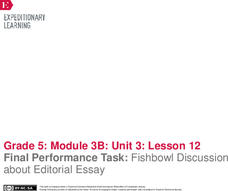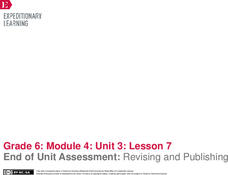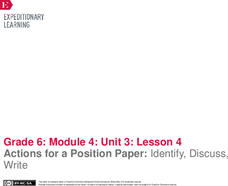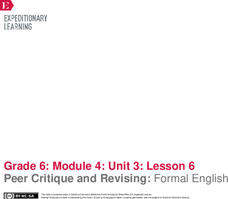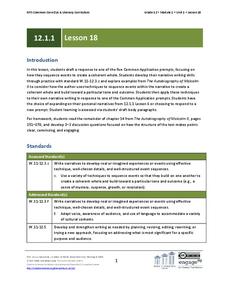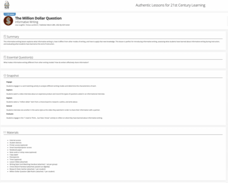Curated OER
Writing Effective Thesis Statements and Introductory Paragraphs for Research Papers
After reading on the topic of their paper, high schoolers work in pairs to assess how to write powerful, precise thesis statements. The introduction contains three statements: a universal statement, a bridge statement, and a thesis...
Curated OER
Narrative Writing: Using Exact Words
Review the narrative writing process with your emerging story writers. They read a sample narrative and identify five vague verbs that could be replaced with a more exact, exciting verb. Then they write a personal narrative making sure...
The New York Times
I Don’t Think So: Writing Effective Counterarguments
When it comes to writing effective arguments, writers must do more than simply make a claim, counterarguments must be considered. Aspiring writers analyze counterarguments in editorials, and then learn how to write counterarguments in...
Curated OER
BBC Learning English, Writing (Culture)
Include this writing worksheet in your lesson about essay organization. After anwering five questions regarding their culture, middle schoolers use their responses to form the basis of a five paragraph guide to their culture. Each...
EngageNY
Grade 9 ELA Module 1: Unit 3, Lesson 7
How does Shakespeare use dialogue to develop the idea that the star-crossed lovers are more concerned with their relationship as individuals than they are with their roles as children of warring families? That is the question facing...
Curated OER
Writing an Essay -The Circulatory System
Fifth graders gather facts about the circulatory system and write an essay. In this circulatory system writing instructional activity, 5th graders read their science book and take notes. Students organize their notes and...
Curated OER
Character Builder
Characters in a story are more than a name to remember. Use a character builder worksheet to write out a character's appearance, background, personality, attributes, and story relevance, including whether they are a main or minor...
EngageNY
End of Unit Assessment: Final Essay
This is just the transition phase. Scholars participate in a mini lesson about using transitions in writing. They then have a brief peer critique of the introduction and conclusion paragraphs for their end of unit assessment. Learners...
EngageNY
Planning for Writing: Introduction and Conclusion of a Literary Analysis Essay
First and last impressions are important. Using the helpful resource, scholars draft the introductory and concluding paragraphs of their literary analysis essays. Next, they use a writing evaluation rubric to self-assess their work.
EngageNY
Peer Critique and Revision: Editorial Essay
Get those red pens ready! Using the Peer Critique protocol, scholars provide and receive feedback on their editorial essay drafts. They then use class time to work on revisions.
EngageNY
The Painted Essay for Opinion Writing: Developing a Conclusion and Adding Linking Words
Let's get colorful! Scholars use the Painted Essay technique to analyze and color code the conclusion of a model essay. Working in small groups, pupils then write a conclusion paragraph for their draft editorials about offshore...
EngageNY
Final Performance Task: Fishbowl Discussion about Editorial Essay
Using the resource, learners share their essay revisions with a partner. Afterward, they participate in a Fishbowl discussion, receiving peer feedback about their editorial essays.
K20 LEARN
Introduction to Expository Writing
Move beyond the five-paragraph essay with a lesson introducing young writers to various forms of expository writing. Class members examine description, cause and effect, problem solution, sequence, and comparison forms. They create an...
EngageNY
End of Unit Assessment: Revising and Publishing
Dictionaries, thesauruses, word walls, oh my! Pupils use several resources to revise their position papers to include appropriate vocabulary. Then, after peer editing, scholars write the final drafts of their essays and self-assess using...
EngageNY
Actions for a Position Paper: Identify, Discuss, Write
Anchors aweigh, it's time to write! After viewing an anchor chart detailing the parts of a position paper, pupils share their plans for their essays with a partner. Next, they write the rough draft of their body paragraphs.
EngageNY
Grade 12 ELA Module 1: Unit 1, Lesson 27
Using their notes developed throughout the unit, class members prepare for the end of the unit assessment by writing a formal essay in which they "analyze how the author of The Autobiography of Malcolm X provides a conclusion that...
PBS
Lessons in Leadership, Roosevelt Style
It's easy to criticize those in power until you're sitting at their desk, faced with the same decisions. A history lesson prompts secondary learners to research the Roosevelt presidencies through the lens of leadership and...
Encyclopedia Britannica
Candidate Reflection Essay
After writing about which of the 2020 presidential candidates the class has researched most closely represents their ideas, young political scientists take a 2020 Presidential Election Candidate Quiz to determine what candidate they in...
EngageNY
Peer Critique and Revising: Formal English
Dear Sir or Madam: What's the difference between formal and informal language? Scholars focus on using formal English and transitions in their position papers. After revising their rough drafts, they engage in the peer editing process...
EngageNY
Grade 12 ELA Module 1: Unit 1, Lesson 28
After discussing Haley's techniques in his conclusion of The Autobiography of Malcolm X, class time is devoted to drafting, sharing, and getting feedback on writers' college essays.
EngageNY
Grade 12 ELA Module 1: Unit 1, Lesson 18
Class members take a break from discussing The Autobiography of Malcolm X to focus on their personal narrative essays. Before working on their drafts, they review what they have learned from their study of Haley's narrative about...
Curated OER
Informative Writing for the Winter Season
Informational writing lessons can be creative and motivating for students.
K20 LEARN
The Million Dollar Question: Informative Writing
Introduce high school freshmen to the characteristics of informative writing with a 5-day activity that distinguishes informative writing from other modes. Scholars learn how to search for and cite reliable resources, then research and...
Scholastic
Smart Quotes Mini-Lesson
Prepare for an interview project with a set of worksheets about asking questions and quoting people. After completing a grammar exercise about quotation marks, kids write out the questions they want to ask their interviewee, and record...













